Environmental Impact: Fast Fashion Sustainability in the UK
VerifiedAdded on 2022/10/01
|6
|1603
|66
Case Study
AI Summary
This case study examines the sustainability challenges of the fast fashion industry within the United Kingdom. It delves into the environmental impacts, including carbon emissions from supply chains and waste disposal, and water usage in cotton production and fabric dyeing. The study highlights the rapid production and consumption cycle, where consumers purchase and discard clothing at an unsustainable rate. Key stakeholders, including the government, fashion brands, and consumers, are analyzed for their roles and responsibilities. While acknowledging the complexities, the case study suggests potential solutions such as recycling, reusing, and raising public awareness through campaigns and legislation to mitigate the negative environmental effects and promote a more sustainable approach to fashion. The study emphasizes the need for a multi-faceted approach involving all stakeholders to foster lasting change within the industry.
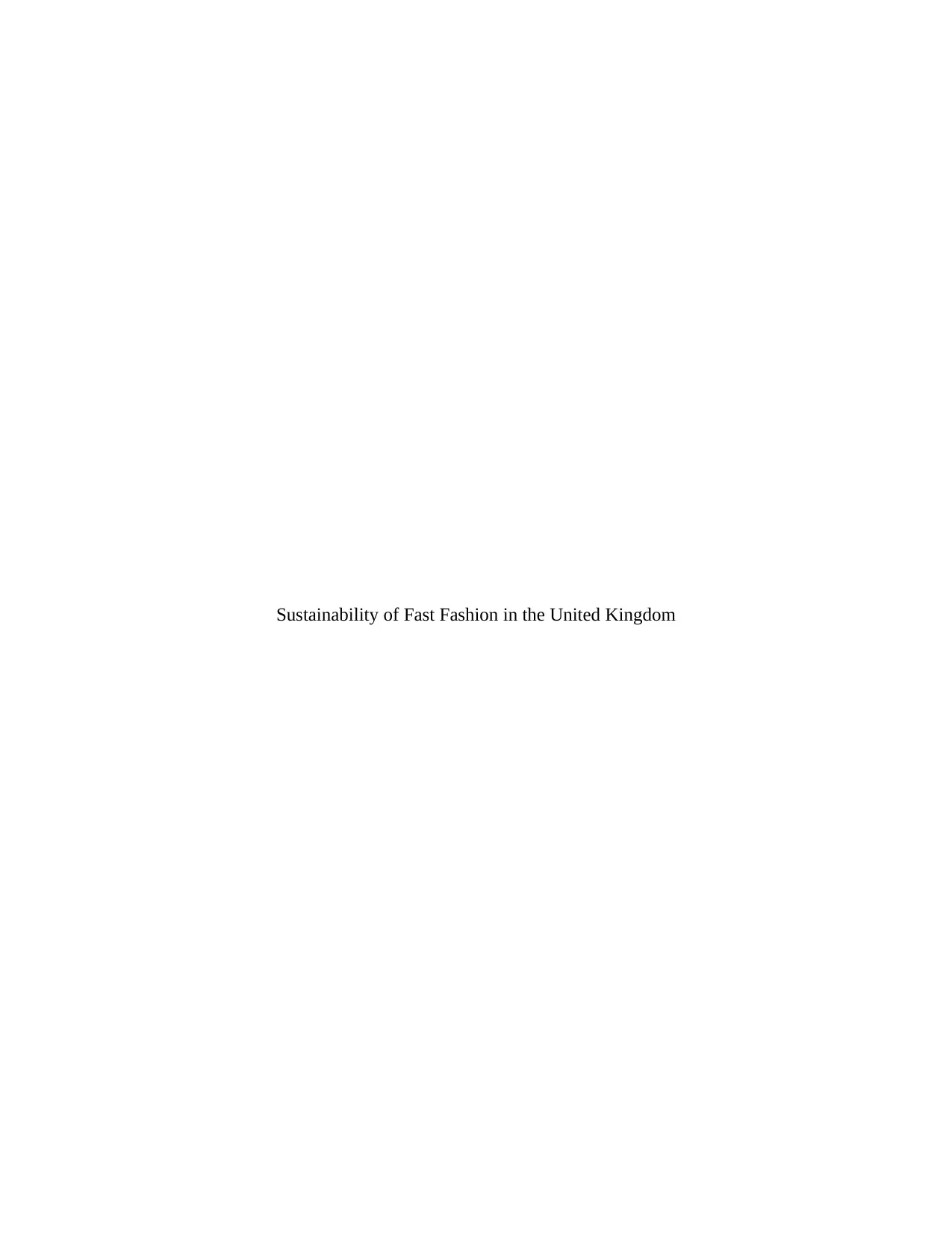
Sustainability of Fast Fashion in the United Kingdom
Paraphrase This Document
Need a fresh take? Get an instant paraphrase of this document with our AI Paraphraser
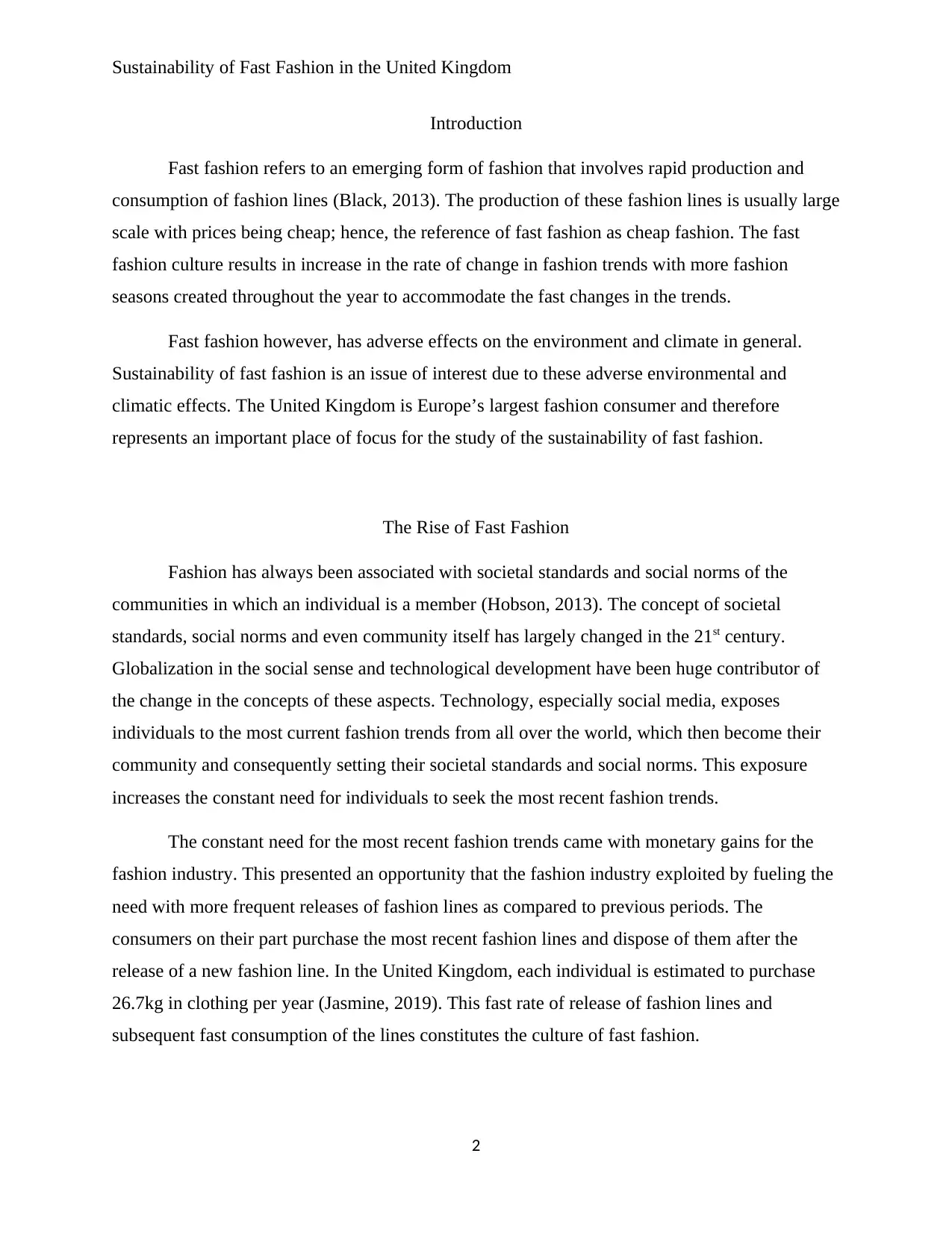
Sustainability of Fast Fashion in the United Kingdom
Introduction
Fast fashion refers to an emerging form of fashion that involves rapid production and
consumption of fashion lines (Black, 2013). The production of these fashion lines is usually large
scale with prices being cheap; hence, the reference of fast fashion as cheap fashion. The fast
fashion culture results in increase in the rate of change in fashion trends with more fashion
seasons created throughout the year to accommodate the fast changes in the trends.
Fast fashion however, has adverse effects on the environment and climate in general.
Sustainability of fast fashion is an issue of interest due to these adverse environmental and
climatic effects. The United Kingdom is Europe’s largest fashion consumer and therefore
represents an important place of focus for the study of the sustainability of fast fashion.
The Rise of Fast Fashion
Fashion has always been associated with societal standards and social norms of the
communities in which an individual is a member (Hobson, 2013). The concept of societal
standards, social norms and even community itself has largely changed in the 21st century.
Globalization in the social sense and technological development have been huge contributor of
the change in the concepts of these aspects. Technology, especially social media, exposes
individuals to the most current fashion trends from all over the world, which then become their
community and consequently setting their societal standards and social norms. This exposure
increases the constant need for individuals to seek the most recent fashion trends.
The constant need for the most recent fashion trends came with monetary gains for the
fashion industry. This presented an opportunity that the fashion industry exploited by fueling the
need with more frequent releases of fashion lines as compared to previous periods. The
consumers on their part purchase the most recent fashion lines and dispose of them after the
release of a new fashion line. In the United Kingdom, each individual is estimated to purchase
26.7kg in clothing per year (Jasmine, 2019). This fast rate of release of fashion lines and
subsequent fast consumption of the lines constitutes the culture of fast fashion.
2
Introduction
Fast fashion refers to an emerging form of fashion that involves rapid production and
consumption of fashion lines (Black, 2013). The production of these fashion lines is usually large
scale with prices being cheap; hence, the reference of fast fashion as cheap fashion. The fast
fashion culture results in increase in the rate of change in fashion trends with more fashion
seasons created throughout the year to accommodate the fast changes in the trends.
Fast fashion however, has adverse effects on the environment and climate in general.
Sustainability of fast fashion is an issue of interest due to these adverse environmental and
climatic effects. The United Kingdom is Europe’s largest fashion consumer and therefore
represents an important place of focus for the study of the sustainability of fast fashion.
The Rise of Fast Fashion
Fashion has always been associated with societal standards and social norms of the
communities in which an individual is a member (Hobson, 2013). The concept of societal
standards, social norms and even community itself has largely changed in the 21st century.
Globalization in the social sense and technological development have been huge contributor of
the change in the concepts of these aspects. Technology, especially social media, exposes
individuals to the most current fashion trends from all over the world, which then become their
community and consequently setting their societal standards and social norms. This exposure
increases the constant need for individuals to seek the most recent fashion trends.
The constant need for the most recent fashion trends came with monetary gains for the
fashion industry. This presented an opportunity that the fashion industry exploited by fueling the
need with more frequent releases of fashion lines as compared to previous periods. The
consumers on their part purchase the most recent fashion lines and dispose of them after the
release of a new fashion line. In the United Kingdom, each individual is estimated to purchase
26.7kg in clothing per year (Jasmine, 2019). This fast rate of release of fashion lines and
subsequent fast consumption of the lines constitutes the culture of fast fashion.
2
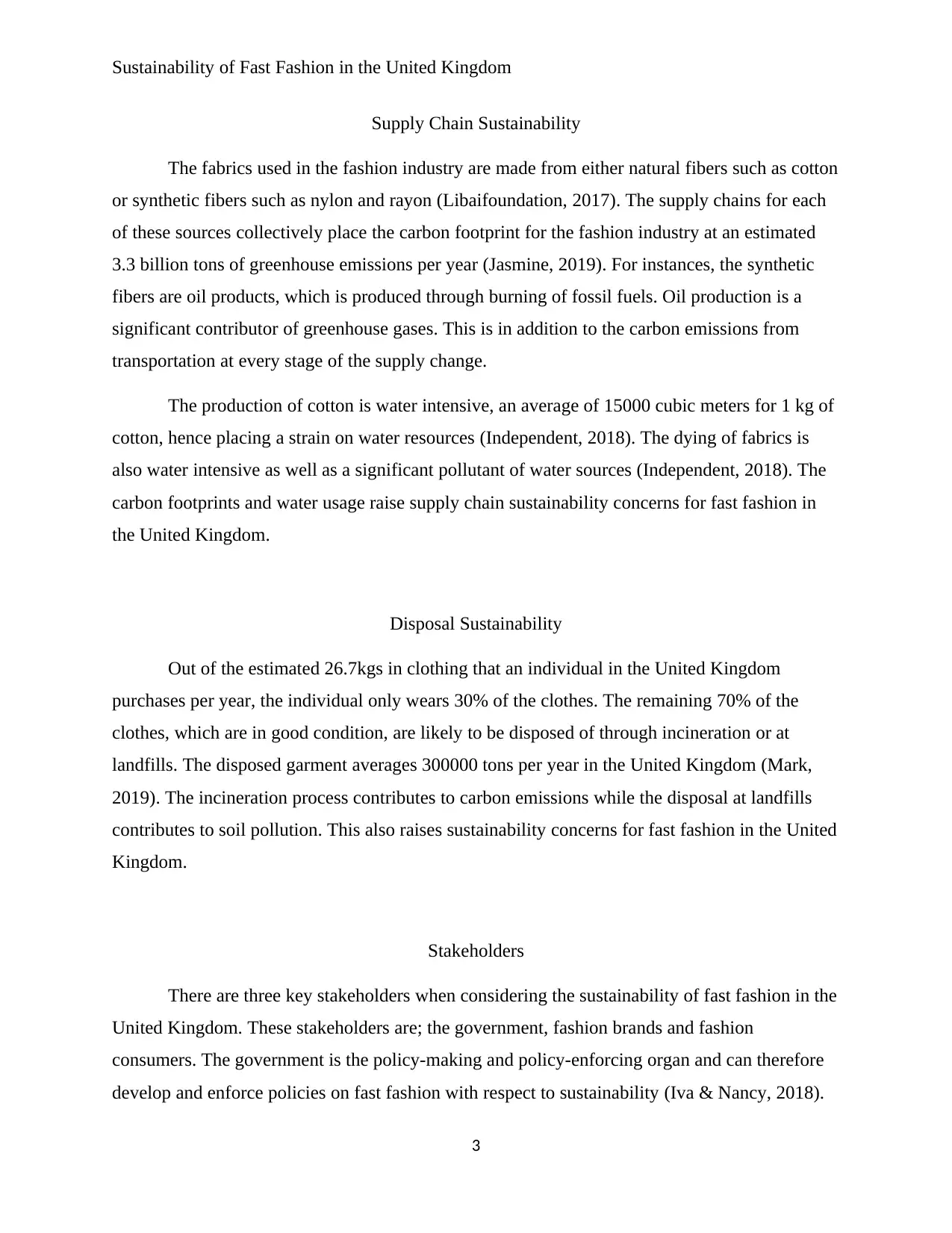
Sustainability of Fast Fashion in the United Kingdom
Supply Chain Sustainability
The fabrics used in the fashion industry are made from either natural fibers such as cotton
or synthetic fibers such as nylon and rayon (Libaifoundation, 2017). The supply chains for each
of these sources collectively place the carbon footprint for the fashion industry at an estimated
3.3 billion tons of greenhouse emissions per year (Jasmine, 2019). For instances, the synthetic
fibers are oil products, which is produced through burning of fossil fuels. Oil production is a
significant contributor of greenhouse gases. This is in addition to the carbon emissions from
transportation at every stage of the supply change.
The production of cotton is water intensive, an average of 15000 cubic meters for 1 kg of
cotton, hence placing a strain on water resources (Independent, 2018). The dying of fabrics is
also water intensive as well as a significant pollutant of water sources (Independent, 2018). The
carbon footprints and water usage raise supply chain sustainability concerns for fast fashion in
the United Kingdom.
Disposal Sustainability
Out of the estimated 26.7kgs in clothing that an individual in the United Kingdom
purchases per year, the individual only wears 30% of the clothes. The remaining 70% of the
clothes, which are in good condition, are likely to be disposed of through incineration or at
landfills. The disposed garment averages 300000 tons per year in the United Kingdom (Mark,
2019). The incineration process contributes to carbon emissions while the disposal at landfills
contributes to soil pollution. This also raises sustainability concerns for fast fashion in the United
Kingdom.
Stakeholders
There are three key stakeholders when considering the sustainability of fast fashion in the
United Kingdom. These stakeholders are; the government, fashion brands and fashion
consumers. The government is the policy-making and policy-enforcing organ and can therefore
develop and enforce policies on fast fashion with respect to sustainability (Iva & Nancy, 2018).
3
Supply Chain Sustainability
The fabrics used in the fashion industry are made from either natural fibers such as cotton
or synthetic fibers such as nylon and rayon (Libaifoundation, 2017). The supply chains for each
of these sources collectively place the carbon footprint for the fashion industry at an estimated
3.3 billion tons of greenhouse emissions per year (Jasmine, 2019). For instances, the synthetic
fibers are oil products, which is produced through burning of fossil fuels. Oil production is a
significant contributor of greenhouse gases. This is in addition to the carbon emissions from
transportation at every stage of the supply change.
The production of cotton is water intensive, an average of 15000 cubic meters for 1 kg of
cotton, hence placing a strain on water resources (Independent, 2018). The dying of fabrics is
also water intensive as well as a significant pollutant of water sources (Independent, 2018). The
carbon footprints and water usage raise supply chain sustainability concerns for fast fashion in
the United Kingdom.
Disposal Sustainability
Out of the estimated 26.7kgs in clothing that an individual in the United Kingdom
purchases per year, the individual only wears 30% of the clothes. The remaining 70% of the
clothes, which are in good condition, are likely to be disposed of through incineration or at
landfills. The disposed garment averages 300000 tons per year in the United Kingdom (Mark,
2019). The incineration process contributes to carbon emissions while the disposal at landfills
contributes to soil pollution. This also raises sustainability concerns for fast fashion in the United
Kingdom.
Stakeholders
There are three key stakeholders when considering the sustainability of fast fashion in the
United Kingdom. These stakeholders are; the government, fashion brands and fashion
consumers. The government is the policy-making and policy-enforcing organ and can therefore
develop and enforce policies on fast fashion with respect to sustainability (Iva & Nancy, 2018).
3
⊘ This is a preview!⊘
Do you want full access?
Subscribe today to unlock all pages.

Trusted by 1+ million students worldwide
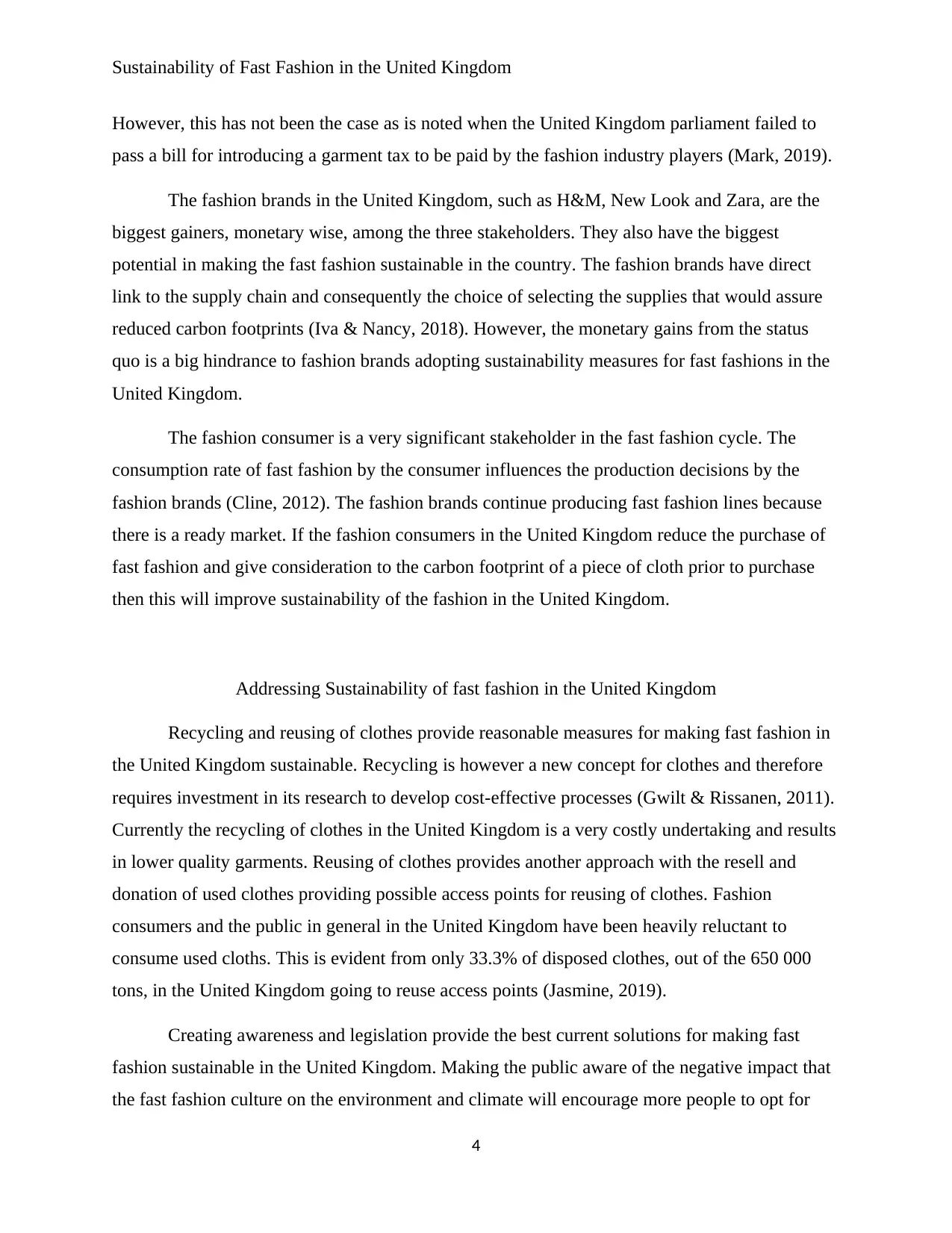
Sustainability of Fast Fashion in the United Kingdom
However, this has not been the case as is noted when the United Kingdom parliament failed to
pass a bill for introducing a garment tax to be paid by the fashion industry players (Mark, 2019).
The fashion brands in the United Kingdom, such as H&M, New Look and Zara, are the
biggest gainers, monetary wise, among the three stakeholders. They also have the biggest
potential in making the fast fashion sustainable in the country. The fashion brands have direct
link to the supply chain and consequently the choice of selecting the supplies that would assure
reduced carbon footprints (Iva & Nancy, 2018). However, the monetary gains from the status
quo is a big hindrance to fashion brands adopting sustainability measures for fast fashions in the
United Kingdom.
The fashion consumer is a very significant stakeholder in the fast fashion cycle. The
consumption rate of fast fashion by the consumer influences the production decisions by the
fashion brands (Cline, 2012). The fashion brands continue producing fast fashion lines because
there is a ready market. If the fashion consumers in the United Kingdom reduce the purchase of
fast fashion and give consideration to the carbon footprint of a piece of cloth prior to purchase
then this will improve sustainability of the fashion in the United Kingdom.
Addressing Sustainability of fast fashion in the United Kingdom
Recycling and reusing of clothes provide reasonable measures for making fast fashion in
the United Kingdom sustainable. Recycling is however a new concept for clothes and therefore
requires investment in its research to develop cost-effective processes (Gwilt & Rissanen, 2011).
Currently the recycling of clothes in the United Kingdom is a very costly undertaking and results
in lower quality garments. Reusing of clothes provides another approach with the resell and
donation of used clothes providing possible access points for reusing of clothes. Fashion
consumers and the public in general in the United Kingdom have been heavily reluctant to
consume used cloths. This is evident from only 33.3% of disposed clothes, out of the 650 000
tons, in the United Kingdom going to reuse access points (Jasmine, 2019).
Creating awareness and legislation provide the best current solutions for making fast
fashion sustainable in the United Kingdom. Making the public aware of the negative impact that
the fast fashion culture on the environment and climate will encourage more people to opt for
4
However, this has not been the case as is noted when the United Kingdom parliament failed to
pass a bill for introducing a garment tax to be paid by the fashion industry players (Mark, 2019).
The fashion brands in the United Kingdom, such as H&M, New Look and Zara, are the
biggest gainers, monetary wise, among the three stakeholders. They also have the biggest
potential in making the fast fashion sustainable in the country. The fashion brands have direct
link to the supply chain and consequently the choice of selecting the supplies that would assure
reduced carbon footprints (Iva & Nancy, 2018). However, the monetary gains from the status
quo is a big hindrance to fashion brands adopting sustainability measures for fast fashions in the
United Kingdom.
The fashion consumer is a very significant stakeholder in the fast fashion cycle. The
consumption rate of fast fashion by the consumer influences the production decisions by the
fashion brands (Cline, 2012). The fashion brands continue producing fast fashion lines because
there is a ready market. If the fashion consumers in the United Kingdom reduce the purchase of
fast fashion and give consideration to the carbon footprint of a piece of cloth prior to purchase
then this will improve sustainability of the fashion in the United Kingdom.
Addressing Sustainability of fast fashion in the United Kingdom
Recycling and reusing of clothes provide reasonable measures for making fast fashion in
the United Kingdom sustainable. Recycling is however a new concept for clothes and therefore
requires investment in its research to develop cost-effective processes (Gwilt & Rissanen, 2011).
Currently the recycling of clothes in the United Kingdom is a very costly undertaking and results
in lower quality garments. Reusing of clothes provides another approach with the resell and
donation of used clothes providing possible access points for reusing of clothes. Fashion
consumers and the public in general in the United Kingdom have been heavily reluctant to
consume used cloths. This is evident from only 33.3% of disposed clothes, out of the 650 000
tons, in the United Kingdom going to reuse access points (Jasmine, 2019).
Creating awareness and legislation provide the best current solutions for making fast
fashion sustainable in the United Kingdom. Making the public aware of the negative impact that
the fast fashion culture on the environment and climate will encourage more people to opt for
4
Paraphrase This Document
Need a fresh take? Get an instant paraphrase of this document with our AI Paraphraser
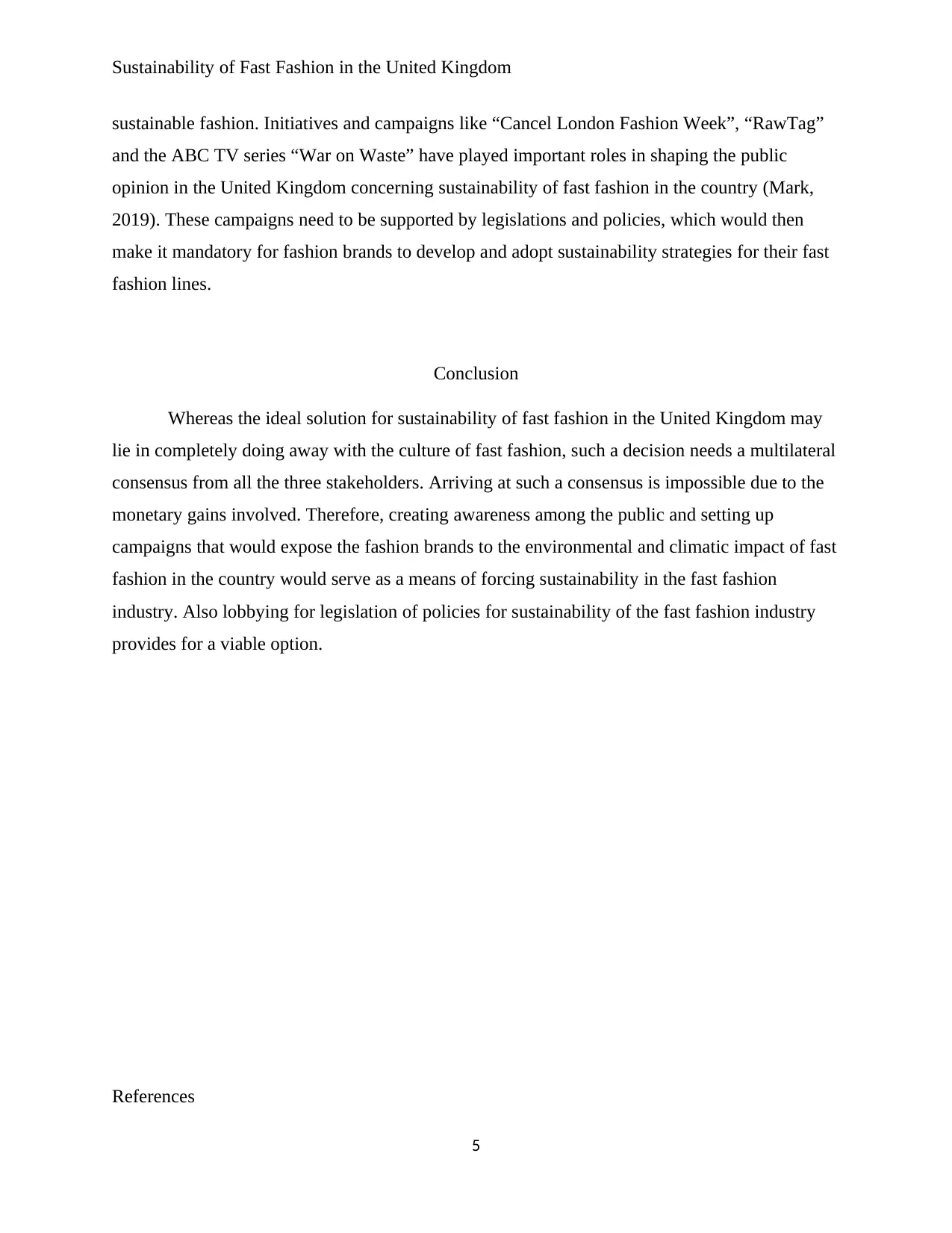
Sustainability of Fast Fashion in the United Kingdom
sustainable fashion. Initiatives and campaigns like “Cancel London Fashion Week”, “RawTag”
and the ABC TV series “War on Waste” have played important roles in shaping the public
opinion in the United Kingdom concerning sustainability of fast fashion in the country (Mark,
2019). These campaigns need to be supported by legislations and policies, which would then
make it mandatory for fashion brands to develop and adopt sustainability strategies for their fast
fashion lines.
Conclusion
Whereas the ideal solution for sustainability of fast fashion in the United Kingdom may
lie in completely doing away with the culture of fast fashion, such a decision needs a multilateral
consensus from all the three stakeholders. Arriving at such a consensus is impossible due to the
monetary gains involved. Therefore, creating awareness among the public and setting up
campaigns that would expose the fashion brands to the environmental and climatic impact of fast
fashion in the country would serve as a means of forcing sustainability in the fast fashion
industry. Also lobbying for legislation of policies for sustainability of the fast fashion industry
provides for a viable option.
References
5
sustainable fashion. Initiatives and campaigns like “Cancel London Fashion Week”, “RawTag”
and the ABC TV series “War on Waste” have played important roles in shaping the public
opinion in the United Kingdom concerning sustainability of fast fashion in the country (Mark,
2019). These campaigns need to be supported by legislations and policies, which would then
make it mandatory for fashion brands to develop and adopt sustainability strategies for their fast
fashion lines.
Conclusion
Whereas the ideal solution for sustainability of fast fashion in the United Kingdom may
lie in completely doing away with the culture of fast fashion, such a decision needs a multilateral
consensus from all the three stakeholders. Arriving at such a consensus is impossible due to the
monetary gains involved. Therefore, creating awareness among the public and setting up
campaigns that would expose the fashion brands to the environmental and climatic impact of fast
fashion in the country would serve as a means of forcing sustainability in the fast fashion
industry. Also lobbying for legislation of policies for sustainability of the fast fashion industry
provides for a viable option.
References
5
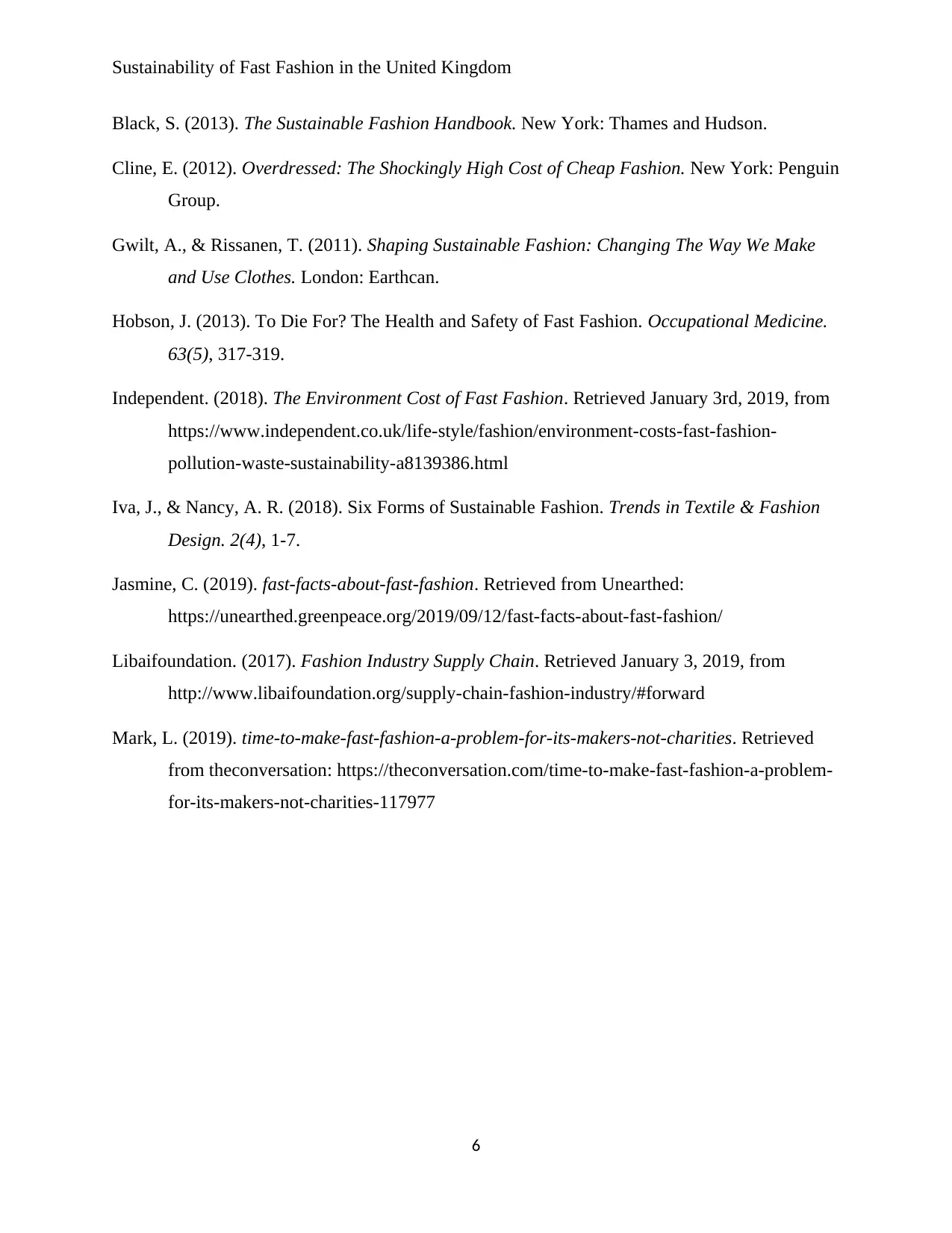
Sustainability of Fast Fashion in the United Kingdom
Black, S. (2013). The Sustainable Fashion Handbook. New York: Thames and Hudson.
Cline, E. (2012). Overdressed: The Shockingly High Cost of Cheap Fashion. New York: Penguin
Group.
Gwilt, A., & Rissanen, T. (2011). Shaping Sustainable Fashion: Changing The Way We Make
and Use Clothes. London: Earthcan.
Hobson, J. (2013). To Die For? The Health and Safety of Fast Fashion. Occupational Medicine.
63(5), 317-319.
Independent. (2018). The Environment Cost of Fast Fashion. Retrieved January 3rd, 2019, from
https://www.independent.co.uk/life-style/fashion/environment-costs-fast-fashion-
pollution-waste-sustainability-a8139386.html
Iva, J., & Nancy, A. R. (2018). Six Forms of Sustainable Fashion. Trends in Textile & Fashion
Design. 2(4), 1-7.
Jasmine, C. (2019). fast-facts-about-fast-fashion. Retrieved from Unearthed:
https://unearthed.greenpeace.org/2019/09/12/fast-facts-about-fast-fashion/
Libaifoundation. (2017). Fashion Industry Supply Chain. Retrieved January 3, 2019, from
http://www.libaifoundation.org/supply-chain-fashion-industry/#forward
Mark, L. (2019). time-to-make-fast-fashion-a-problem-for-its-makers-not-charities. Retrieved
from theconversation: https://theconversation.com/time-to-make-fast-fashion-a-problem-
for-its-makers-not-charities-117977
6
Black, S. (2013). The Sustainable Fashion Handbook. New York: Thames and Hudson.
Cline, E. (2012). Overdressed: The Shockingly High Cost of Cheap Fashion. New York: Penguin
Group.
Gwilt, A., & Rissanen, T. (2011). Shaping Sustainable Fashion: Changing The Way We Make
and Use Clothes. London: Earthcan.
Hobson, J. (2013). To Die For? The Health and Safety of Fast Fashion. Occupational Medicine.
63(5), 317-319.
Independent. (2018). The Environment Cost of Fast Fashion. Retrieved January 3rd, 2019, from
https://www.independent.co.uk/life-style/fashion/environment-costs-fast-fashion-
pollution-waste-sustainability-a8139386.html
Iva, J., & Nancy, A. R. (2018). Six Forms of Sustainable Fashion. Trends in Textile & Fashion
Design. 2(4), 1-7.
Jasmine, C. (2019). fast-facts-about-fast-fashion. Retrieved from Unearthed:
https://unearthed.greenpeace.org/2019/09/12/fast-facts-about-fast-fashion/
Libaifoundation. (2017). Fashion Industry Supply Chain. Retrieved January 3, 2019, from
http://www.libaifoundation.org/supply-chain-fashion-industry/#forward
Mark, L. (2019). time-to-make-fast-fashion-a-problem-for-its-makers-not-charities. Retrieved
from theconversation: https://theconversation.com/time-to-make-fast-fashion-a-problem-
for-its-makers-not-charities-117977
6
⊘ This is a preview!⊘
Do you want full access?
Subscribe today to unlock all pages.

Trusted by 1+ million students worldwide
1 out of 6
Your All-in-One AI-Powered Toolkit for Academic Success.
+13062052269
info@desklib.com
Available 24*7 on WhatsApp / Email
![[object Object]](/_next/static/media/star-bottom.7253800d.svg)
Unlock your academic potential
Copyright © 2020–2026 A2Z Services. All Rights Reserved. Developed and managed by ZUCOL.

